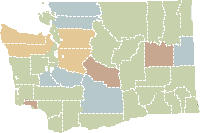 |
 |
 |
|
|
Tuesday, April 6, 2004 Page 3 of 3 In early 1989, a legislative task force expressed alarm at excessive public-defense caseloads, an absence of standards and a dramatic shift among local governments toward contracts that paid as little as $12 a case. The panel urged the state to subsidize indigent defense — paying as much as 50 percent of costs — and to attach conditions to that money. Only counties that adopted standards, including caseload limits, would get state funding. What the Legislature passed was a law requiring standards — but without the financial inducement. "It was purely finance," says Philip Thompson, a retired Washington Court of Appeals judge who was the task-force chairman. Former Republican state Sen. Gary Nelson helped sponsor the law. At the time, he says, annual indigent-defense costs topped $30 million statewide. (That figure is now at least $75 million, by one estimate.) Some lawmakers wanted no part of that tab. "After 22 years in the Legislature, there is one area of disappointment or regret — and you have found my Achilles heel," says Nelson, now a Snohomish County Council member. "This is the one area where I wasn't able to accomplish quite what I wanted to. And it keeps avoiding my grasp." Another advisory group, chaired by then-Lt. Gov. Joel Pritchard, renewed the call for state funding in 1991. "The time for study is over. The time for action has arrived," the group's report said. That study landed on the same pile as its predecessors. Nationally, Washington ranks with the bottom seven states in helping fund public defense, according to a study by The Spangenberg Group, a research and consulting firm. The average state funding level is 50 percent; in Washington it's 5.5 percent — and would be even lower, except the state pays for indigent appeals. The state's standing drops if you include the cost of all judicial and legal services — not just indigent defense. The Bureau of Justice Statistics calculates the share of judicial and legal services paid for by states versus local governments. By that criterion, Washington ranks 50th. "We're last. We're dead last," says Mary McQueen, administrator of the state's Administrative Office of the Courts. King County Superior Court Judge Deborah Fleck says the lack of state funding puts indigent defense at the mercy of a county's financial health. "There should be equal access to capable counsel across the state," Fleck says. "It should not be dependent upon the fiscal vagaries of a particular county."
UP TO THE LAWYERS
Nothing can measure quality of representation with precision, so comparing Washington with other states becomes somewhat subjective.
Legal experts and indigent-defense studies have suggested a variety of alternatives for improving Washington's quality of representation. They include abolishing the use of fixed-fee contracts; creating a statewide public defender system; or finding some middle ground where states and local governments share the cost of trial-level indigent defense. In its report issued in March, the ACLU of Washington urged the state to set specific, enforceable standards in such areas as caseload limits, and then monitor compliance. Struggling public-defense systems in other states are becoming the subject of lawsuits. The ACLU has sued Montana, saying inadequate state funding has deprived indigent defendants of effective counsel. The state's failure to respond to problems identified by multiple studies shows a "deliberate indifference" to constitutional rights, the ACLU alleges. That lawsuit is still pending. The Mississippi Supreme Court has been asked to review a case in which a county has sued for state funding of indigent defense. Without financial help, the county alleges, it cannot provide the quality of counsel demanded by the Mississippi constitution. "Depending on what happens in that case, it might give us a viable argument to pursue in Washington," says Sophia Byrd, a policy director with the Washington State Association of Counties. Some experts say individual lawyers could help force government to keep its promise of equal defense. "If lawyers around the state were willing to insist on reasonable compensation and reasonable caseload limits, then these practices would go away," Boruchowitz says. "But as long as local governments can find attorneys willing to take these unreasonable caseloads, they'll keep doing it."
Ken Armstrong: 464-3730 or karmstrong@seattletimes.com
|
|
|||||||||||||||
seattletimes.com home
Home delivery
| Contact us
| Search archive
| Site map
| Low-graphic
NWclassifieds
| NWsource
| Advertising info
| The Seattle Times Company
